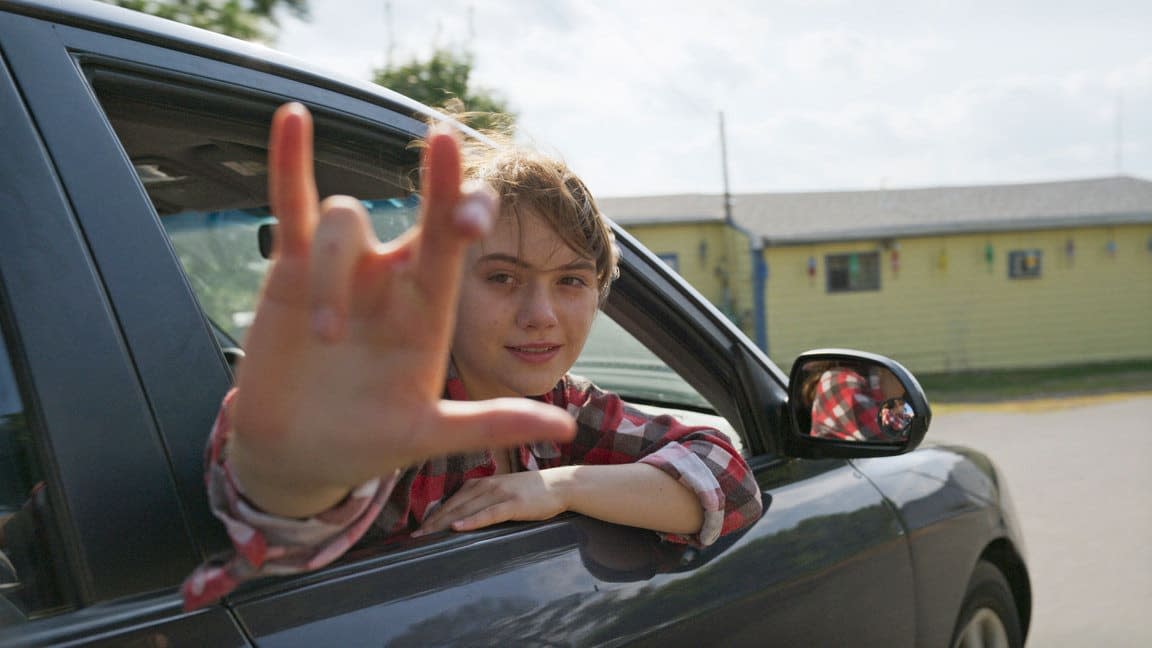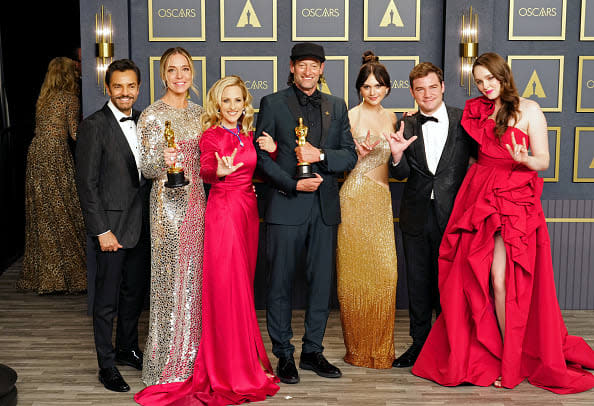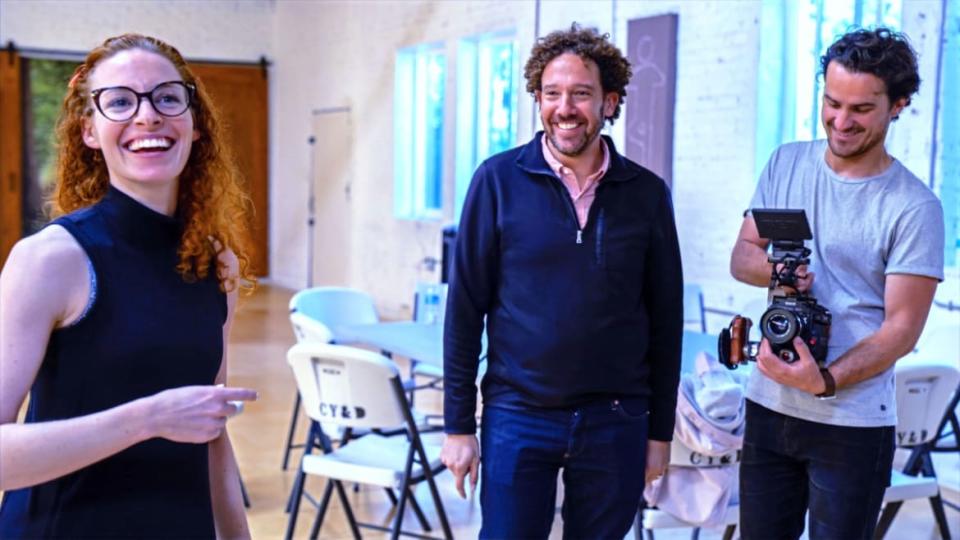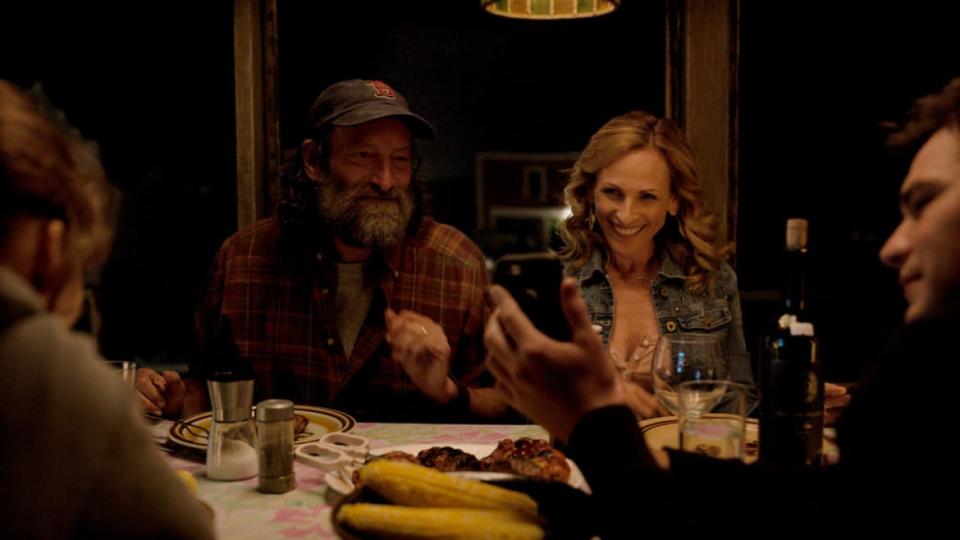After Oscars Glory, Here’s the Plan for ‘CODA’ the Musical

- Oops!Something went wrong.Please try again later.
- Oops!Something went wrong.Please try again later.
- Oops!Something went wrong.Please try again later.
- Oops!Something went wrong.Please try again later.
- Oops!Something went wrong.Please try again later.
It felt like “the home team” won, DJ Kurs says, recalling Oscars night and being at a viewing party watching CODA win best movie, best supporting actor (for Troy Kotsur), and best adapted screenplay (for Sian Heder).
“It was inspirational,” Kurs told The Daily Beast. “The entire room broke out into cheers when Troy won, and when it won best movie we were cheering for them, and to see the representation of our community on screen. For so long we’ve been allowed in the room but not necessarily recognized in the room. To have this recognition at the Oscars was so exciting.”
Since 2012, Kurs has been the artistic director of Deaf West Theatre, the Los Angeles-based theater company where Kotsur and fellow CODA stars Marlee Matlin and Daniel Durant have long performed. Now Kurs is spearheading the adaptation of CODA into a stage musical. CODA’s Oscars rout didn’t even seem “in the realm of possibility” three months previously, Kurs said, and the gathering momentum before the Oscars of it receiving other awards was extremely validating.
‘CODA’ Winner Troy Kotsur Brings Oscars to Tears With Emotional Sign Language Speech
“Marlee is amazing [Matlin was the first deaf actor to win an Academy Award in 1987],” Kurs said. “Troy has been in 22 of our shows. It’s like, ‘Oh, OK, finally the world is recognizing how good he is.’ Directors and artists have always been blown away by his work. I started attending Deaf West shows as a young student. I remember seeing Troy and thinking he should be on TV and in film. I felt, ‘Why is the world taking so long to recognize this man?’ The same is true for Daniel Durant.”
Does Kurs want Kotsur, Matlin, and Durant to appear in the stage version of CODA? “Why not?” he laughs. “It would be so cool. All three of them were in Spring Awakening. Troy did four musicals with us over the years. We would welcome them any time. I’m ready to move into the rehearsal room with them. Right now, I think they’re still on cloud nine. I spoke with them the other day. They’re floating still. If they ever come down to planet Earth, I’ll have to wait for the buzz to wear off before I broach the subject.”

Eugenio Derbez, Sian Heder, Marlee Matlin, Troy Kotsur, Emilia Jones, Daniel Durant and Amy Forsyth, winners of the Best Picture award for “CODA,” pose in the press room during the 94th Annual Academy Awards at Hollywood and Highland on March 27, 2022 in Hollywood, California.
Before all that, this week Deaf West is collaborating with the Los Angeles Philharmonic (under Gustavo Dudamel) in an innovative new production of Beethoven’s only opera, Fidelio, created for both deaf and hearing audiences, running Thursday night through Saturday.
“The music in Fidelio works hand in hand with themes of longing and freedom, which resonate with members of our community,” Kurs told The Daily Beast. “In this staging, ASL becomes the central medium of storytelling. It is the perfect vehicle, with all of its nuances, movement, and poetry, to express the desires of the characters.
“May I be as bold to say that all operas should be signed? The addition of the language increases the expressivity of the medium and enhances the storytelling potential. We have had so much fun in our collaboration and we can’t wait to continue the trailblazing work that we’ve started here. We are breaking new ground. There are duets, trios, and quartets that achieve vocal harmony—and if I may say so, these same songs achieve a different sort of harmony in ASL. It’s all very novel, but I sense that this will be a big hit with our audiences.
“We want to honor the journey that new audience members make when they come to the show. It will be an act of bravery to step into a space that is normally inaccessible to them. Setting foot in Disney Hall will be like traveling to a foreign country with its own customs and traditions. The underpinnings of the story are universal, and it is our hope that these audiences will be rewarded with a transporting experience. Our job at Deaf West is to make the boundaries between languages and cultures disappear. When there is full access, the performers are able to work in the way they want, as artists who want to create and inspire.”

DJ Kurs (center) in a rehearsal.
Kurs is also hopeful that CODA’s success will be a breakthrough moment for deaf representation on screen, and in Hollywood more generally, that “the doors opened from this will naturally lead to something more. We have other great actors waiting in the wings waiting to enter the industry. I do sense a shift in the last two to three years of Hollywood being more open to our ideas and stories. The other day I went to a pitch meeting for a deaf Flashdance. Who knew they would have that kind of story, that it would even exist? I’m not even saying it’s a good story, but that people have the drive and desire to jump on the bandwagon is good and will lead to opportunities and doors being opened. The train has already left the station, and I’m hoping more and more people will get aboard. That in itself is exciting for me.”
How does Kurs plan to put CODA on stage? He laughed. “I’m old enough to know that you have to stay out of the way of the process.” First, he will oversee the putting together of a “great team of creative leaders” and then hope the answers flow organically from that. Having read the script for CODA and seen La Famille Bélier, the French-Belgian film that CODA is a remake of, Kurs felt it would be “a natural” for the stage. He doesn’t know yet if the same creative team behind the film will bring the movie to the stage; negotiations are ongoing.
Deaf West was founded in 1991. “We have been successful for so long, not just as a deaf theater company. We are a theater company that makes good theater,” said Kurs. “Our founders wanted to create theater that was accessible not just to hearing audiences but to all audiences. That’s the spirit we’ve maintained over the years. Still to this day our core audience is the deaf community. We have a responsibility to deaf people, and our stories have to be told with them in mind first, and then if we’re lucky we will speak to the larger world through our work. Hearing people don’t need to know something or study up on something before coming to one of our shows. They’re having a theatrical experience on a par with everyone else in the house.”
“Our shows have always been performed bilingually, simultaneously in spoken English, sung English, and ASL [American Sign Language)]. That in itself is a different kind of challenge, and I relish the opportunity to bring our creative team together to address this particular property.”
The company is made up of deaf and hearing actors in blended casts, Kurs said, with voice actors occasionally vocalizing what deaf actors are saying (the voice actors often discreetly positioned in the background).
Kurs recalled that Kotsur starred as Stanley in a production of A Streetcar Named Desire, opposite a hearing actress playing Blanche, which accentuated the differences between them. Ali Straker, who went on to win a Tony in 2019 for her role in the acclaimed revival of Oklahoma!, appeared in Deaf West’s Tony-winning 2015 revival of Spring Awakening. CODA as a stage musical could also make its way to Broadway.

Emilia Jones, Troy Kotsur, Marlee Matlin and Daniel Durant in “CODA.”
“Who knows?” Kurs said, with another smile at the prospect. “I think the movie became way bigger than anyone expected, and happened very quickly, and so I feel anything is possible now. But first we have to create a good musical. That’s what’s front and center in my mind.”
One scene he is particularly relishing staging is the moment when the deaf family sees their daughter singing. “They don’t have access to that music, but they understand their daughter is succeeding in that moment because everyone around them is reacting to her. That is how I, as a deaf person, experience music personally. That experience is as joyful for me as listening to music is for hearing people. That is something I am really excited about expressing in the musical of CODA.”
“We always have to fight for ourselves”
Kurs is not an actor, but “from an early age wanted to make things happen. I saw so many talented deaf people around me in college and saw Deaf West productions, which ignited something within me. My first job at Deaf West was as an ASL choreographer, transforming original texts to ASL, wanting to make sure we were bringing the spirit of original texts to our audiences.”
“I think there are more opportunities for deaf people in film, TV, and on stage,” said Kurs, “but at the same time I do have that fear the pendulum will swing back to where it normally is, and everyone is like, ‘We can move on as usual.’ I can’t tolerate that. I want there to be more to grow from. I feel that fire in me still. We should continue the work we have been doing and bring art to the next generation and beyond.
“As deaf people we are born into a world that doesn’t understand us, and from birth we know we have to explain ourselves. We always have to fight for ourselves, and that is the spirit I take into those rooms. I do have experiences of discrimination and intolerance. That doesn’t anger me in the moment. I know my position requires me to explain myself and help others grow as artists themselves, and I need other people to help me to put on shows.”
Coming to see the shows Deaf West puts on is the transformative key, Kurs said. “Our productions are accessible to deaf and hearing audiences alike. They are not just for deaf people. We hope our spirit of an open, welcoming environment will be an avenue to tell more stories and a way to bring those worlds together.”
Before CODA, Deaf West will mount a stage adaptation of Brian Selznick’s book Wonderstruck, which has a deaf lead character. Kurs wants to expand the role of sign language in theatrical productions. “Maybe this is too hubristic,” he said, smiling, “but I think all musicals in the future should be done with sign language. Sign language enhances and supports the choreography and story told through music.” He also wants “the biggest stars” to appear in Deaf West’s productions.
The success of the film will directly benefit the deaf community, said Kurs. “More people are deciding to learn sign language. More employers will open doors to deaf employees and deaf candidates. That in itself is exciting to me.”
“We are born into a world where English is spoken, and we want to communicate with our hands,” said Kurs. “It’s natural to us. Our parents, teachers, and doctors want us to speak. That takes away language from us in our most critical period of language acquisition. That window closes on many people before they’ve acquired language, which leads to what we call ‘language deprivation.’ Many of us are behind in English literacy because of language deprivation early on. So when we try to apply English in written form, it’s a struggle. In a perfect world, we would be allowed to create in sign language initially, not pencil and paper.”
Kurs said many deaf people entering the entertainment industry do not have the same opportunities as hearing people. “It’s hard for them to get a job as a staff writer or assistant. The attitude is ‘how do we accommodate deaf people in the writers’ room?’ Those questions emerge repeatedly. The gatekeepers should be asking us how to do it rather than telling us how it can’t be done. My hope is this moment leads to more open conversations and open dialogue and less ‘Who pays for the interpreter?’ Through the work we do, we know we can always make it happen.”
Deaf West is “freeing” for deaf artists, Kurs said, in that it is a place where they can hone their craft and not have to worry about language and access. It just hosted a theater festival for deaf high school students with classes in writing and playwriting. Kurs thought they would write about their experiences as deaf people, “but they write horror stories, science fiction, romances. They wanted to tell stories just like everyone else. They don’t always want to write stories that are front and center about the deaf experience.”
When this reporter asked about Kurs’ plans for his own future, he said he hadn’t given it much thought. “At the end of the day I hope I have helped people tell their stories and helped them become the artists they can be and that’s what gives me joy.” At Deaf West he wants to pilot bigger, more ambitious projects.
Part of making CODA will also involve listening to criticism from some in the deaf community about aspects of representation in the film.
“The deaf community is not a monolith, it is rich and diverse. There is so much intersectionality. It is so varied. If you ask a deaf person what their experience is like, you will get a different answer from every deaf person. I understand why some people don’t relate to this particular story, and we also have to recognize CODAs [children of deaf adults] have their own conversations and experiences. Our musical will be the next iteration of the story and move the needle forward. Maybe we can continue to advance dialogue through it.”
Why make it a musical rather than a play with music? “Because I think it will be a more interesting way to tell the story,” Kurs said. “The art form of musical theater has not been accessible to the deaf community for so long, and it’s a way to bring more stories into the form of musical theater told with sign language and through a certain cultural lens, and welcome people in to participate in that world.”
Get the Daily Beast's biggest scoops and scandals delivered right to your inbox. Sign up now.
Stay informed and gain unlimited access to the Daily Beast's unmatched reporting. Subscribe now.

